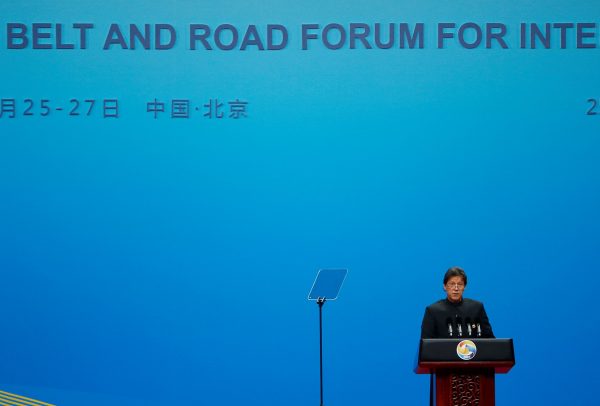This key bilateral relationship has been fraught with difficulties in recent years, especially with Trump’s bullying rhetoric and the US tilt towards India. Pakistan, ever sensitive to its strategic position against its rival India, has sought closer relations with China as a balance against the perceived US–India bloc. China is poised to invest billions in Pakistan through the China–Pakistan Economic Corridor (CPEC), has increased arms sales to become Pakistan’s primary supplier of military hardware, and provided several loans over the past year to bolster the Pakistani economy.
Despite this, there are some within Pakistan that fear going fully into the Chinese camp, expressing concern over China’s political dominance, the militarisation of CPEC and the potential for expanding political violence within Pakistan. As a foil against solely relying on China, the Pakistani government is seeking to strengthen investments from other countries such as Saudi Arabia and the United Kingdom.
The July meeting between Trump and Khan represents an opportunity to reset US–Pakistan relations and to find common ground on a range of strategic issues. With the shifting political landscape of South Asia as a backdrop, what can we expect from Imran Khan’s visit? The White House released a statement that the purpose of this meeting is to ‘discuss a range of issues, including counterterrorism, defense, energy, and trade, with the goal of creating the conditions for a peaceful South Asia and an enduring partnership between our two countries’.
But the key issue looming over Khan’s visit is the ongoing US peace negotiations with the Taliban in Afghanistan as Trump seeks to withdraw US troops from the nearly 18-year-old war zone. The political dynamics of Pakistan’s western neighbour have always been of great concern to Islamabad. Pakistani leaders have long sought to promote a Pakistan-friendly government in Kabul — including supporting the Taliban government in the 1990s, fearing the influence of their long-standing rival India in Afghanistan.
Pakistan has also played a key role in supporting peace talks. Earlier this month, the governments of the United States, Russian, Pakistan, and China released a joint statement welcoming progress made in the negotiations and recognised Pakistan’s ‘important role in facilitating peace in Afghanistan’, a position made clear when Trump sent a letter in December 2018 to Imran Khan requesting Pakistan’s support in the Afghan peace process.
While there are fears among Pakistanis that their country could be used as a US ‘scapegoat’ if the negotiations fail, there are further concerns that Pakistan’s disengagement from the peace process could undermine its strategic position if the Afghan political landscape is shaped without Pakistani input. To this end, a working relationship with the United States is necessary.
To ease the way towards finding common ground with the Trump administration, Pakistan is making efforts to demonstrate its cooperation on counterterrorism in the lead up to Khan’s meeting in Washington. For instance, Pakistani authorities arrested Hafiz Saeed, the head of the US-designated terrorist group Lashkar-e-Taiba responsible for the 2008 Mumbai attack and long suspected of receiving illicit support from Pakistan’s Inter-Services Intelligence agency. The arrest, praised by Trump, comes in the wake of criticisms that the government has not done enough to address the Financial Action Task Force’s decision to list Pakistan as non-compliant with regulations to target terrorist financing.
While the United States continues to press Pakistan on counterterrorism and negotiations in Afghanistan — issues that will receive great attention during Khan’s visit — it is also likely that Pakistani authorities will seek to expand the relationship beyond a narrow security focus. Faced with a struggling economy, a stronger economic relationship with the United States will help to bolster Khan’s PTI government, which campaigned on reversing the economic policies of his predecessor.
This meeting is taking place in the midst of cooling relations between the United States and India, with the Trump administration rescinding India’s preferential trading status as a response to Indian Prime Minister Narendra Modi’s protectionist economic policies. This could be seen as an opportunity for Pakistan to grow its own economic relationship with the United States.
With the shifting political landscape of South Asia, the meeting between Trump and Khan represents a chance for the two countries to renegotiate the terms of what has long been a troubled relationship. Even with the growing alliance between China and Pakistan, there are many Pakistanis who reject the notion of a zero-sum game between China and the United States and wish to pursue working relationships with both countries. This meeting could be the first step toward such a goal.
It is now left to the Trump administration, understanding the important role Pakistan plays in the Afghanistan negotiations, to decide whether they will walk in step with Pakistan to expand and strengthen US–Pakistan relations.
Harrison Akins is a Graduate Research Fellow at the Howard H. Baker, Jr. Center for Public Policy, the University of Tennessee, Knoxville.

